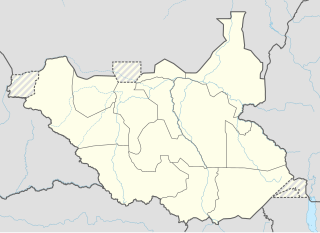Context
The killings of journalists in the world's youngest nation escalated after the start of the civil war in 2013. The civil war broke out after President Kiir and former Vice President Riek Machar began a power struggle that resulted in a division within the military based on ethnicity. [15]
The mass murder of journalists Musa Mohammed, Boutros Martin, Dalia Marko, Randa George, and Adam Juma along with local officials who were traveling with them took place in a single, violent attack on 25 January 2015. [16] The journalists were traveling through the Western Bahr el Ghazal region of South Sudan when their convoy was assaulted by unknown gunmen. Six others were killed in the attack. [16]
The death of reporter Power James Raeth happened under similar circumstances as he was caught in the crossfire between two rival groups in the city of Akobo. The groups were listed as rival factions however suspicion of government intervention still hangs heavily over the entire case. A university student was also killed in the same attack. [6] [7]
The most suspicious case was that of Peter Julius Moi who was killed only days after South Sudan president Salva Kiir made an intimidating statement directed at journalists. He was quoted as saying "If anybody among them (journalists) does not know that this country has killed people, we will demonstrate it one day, one time." The killing of Mr. Moi occurred shortly afterward. [1] Oliver Modi, who currently serves as chairman of the Union of Journalists of South Africa, was quoted as saying "This was an intentional killing" which has only added speculation to the case. [1]
Reactions
Isaiah Diing Abraham Chan Awol
“I condemn the assassination of Isaiah Diing Abraham Chan Awol and call on the South Sudan authorities to respect the fundamental right of freedom of expression which is enshrined in the Universal Declaration of Human Rights. Bringing the murderers of Isaiah Diing Abraham Chan Awol to justice is an essential step in the young country’s construction as a lawful democracy.” - Irina Bokova, director-general of UNESCO [17]
Five journalists
In its reaction, UNESCO noted that two out of the five journalists killed on 25 January 2015 in Western Bahr el Ghazal State of South Sudan were women.
"These deaths are a blow to freedom of information and freedom of expression and I call on the authorities to do all in their power to ensure that these essential rights are protected and that journalists can carry out their work in safe conditions." - Irina Bokova, director-general of UNESCO [1] [6] [16]
Power James Raeth
"“We condemn the senseless killing of Pow James Raeth, somebody who was working for peace and for educating and informing the public." - Hildebrand Bijleveld, director of Radio Tamazuj where Raeth was a freelancer. [7]
Peter Julius Moi
"We condemn the senseless killing of Peter Julius Moi in what has become a deadly year for journalists in South Sudan. More and more independent voices are being silenced in South Sudan at this critical time in the country's history, when the public desperately needs impartial information."- Tom Rhodes, CPJ's East Africa representative [18]
"Today it is Peter, tomorrow is someone else. We are being taken one by one." - Oliver Modi, chairman of the Union of Journalists of South Sudan [19]
"I got personally shocked and am still struggling to recover from the trauma of seeing his dead body lying on the dirt that fateful day. I am not sure how many journalists will go into hiding since this incident, but for now the work spirit among journalists is that of a scared, disillusioned press." - a friend and colleague of Moi's told CPJ. [20]
This page is based on this
Wikipedia article Text is available under the
CC BY-SA 4.0 license; additional terms may apply.
Images, videos and audio are available under their respective licenses.
